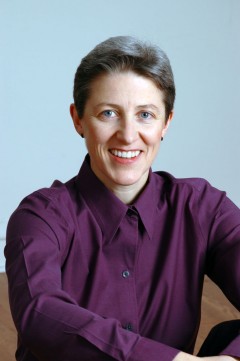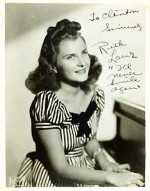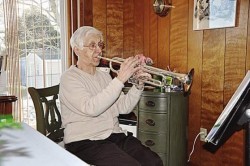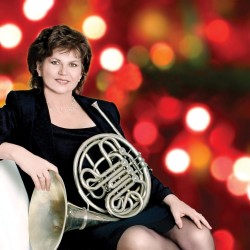Eddie At Ninety
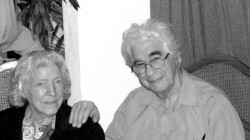 Early in 1921 in Kitchener, Ontario, a local furrier named Joe Graf (and Mrs. Graf) welcomed into the world their third son and named him Edward. In the annals of Canadian music, the rest is history. Early last month I had the pleasure of attending, in the company of a host of luminaries of Canadian music, a party to celebrate Eddie Graf’s 90th birthday.
Early in 1921 in Kitchener, Ontario, a local furrier named Joe Graf (and Mrs. Graf) welcomed into the world their third son and named him Edward. In the annals of Canadian music, the rest is history. Early last month I had the pleasure of attending, in the company of a host of luminaries of Canadian music, a party to celebrate Eddie Graf’s 90th birthday.
Since his father, known as Pop to his kids, played violin and his mother played piano, it was only natural that young Eddie Graf would be drawn to music. His father, a regular at fiddle festivals in the Kitchener area, started Eddie on both violin and clarinet at age five, and it wasn’t long, with some coaching from his mother, before Eddie had learned to play chords on the piano to accompany the fiddlers.
At age 13, Eddie joined the local boys’ band, where the featured boy trumpet soloist was a lad named Erich Traugott, who later was one of the stars of Rob McConnnel’s original Boss Brass. In his late teens Eddie worked in a grocery warehouse by day and played around town in the evenings. In those days in Ontario there were no bars or clubs where alcohol was served. Beer was available for men in beverage rooms. Ladies were permitted, if escorted, to drink in separate “Ladies and Escorts” rooms. It was in one such room where he was hired to play piano one night a week. Among other selections in his repertoire, a piano version of the famous Meditation from the opera Thaïs was a favourite. He was paid the princely sum of $1.25 per night plus free beer. Since he was under-age and a non-drinker, he gave the beer to friends. With money coming in from music, he set his sights on a saxophone. The price was $75. One dollar of each evening’s pay went to pay for his new instrument. (The night before this most recent birthday party, Eddie, as a regular member of the Encore Symphonic Concert Band, played a couple of sax solos in a concert. I have it on good authority that these solos were on a newer sax.)
It wasn’t until he joined the army at age 20 that he became a full-time musician. When he enlisted at Wolseley Barracks in London, Ontario, Eddie was assigned to play second clarinet in the band. While there, he also played in various big bands around town and continued to arrange. Meanwhile, over in England, Canadian Bob Farnon, formerly of the old CBC radio show The Happy Gang, had been given the job of assembling musical show groups to entertain service personnel. On a trip back to Canada to line up more talent for his “Army Shows,” Farnon visited Wolseley Barracks. Eddie auditioned and was soon sent off to England.
Shortly after his arrival in the camp near Greenwich he was assigned to Bob Farnon’s band. About a week after Eddie joined the band, Farnon’s brother left the band on compassionate leave and Eddie replaced him in the lead alto sax chair of that prestigious group. Concerts entertaining the troops were routinely interrupted by Luftwaffe aircraft attacks and the infamous “Buzz Bombs.” After the Normandy beaches were secured and the allied armies moved inland, Eddie’s band landed at Caen and subsequently followed the action as the armies advanced through France, Belgium, Holland and ultimately Germany.
In England there was often a number of bands, singers and dancers stationed in the same camp, who in their off hours mingled and made friendships. At some point, on a return from Holland to a camp near Guilford in England, Eddie struck up a friendship with a young dancer from Toronto named Bernice O’Donell, “Bunny,” as she was known to her friends. Some time before the war ended, Bunny’s show was sent off to Holland and Belgium. A bit later Eddie’s show, now a big band stage show, was off to the continent. Lo and behold their paths crossed again in Amsterdam.
After VE day in May 1945, the entertainment groups continued in Europe for many months. By the early fall, both Bunny and Eddie were sent back to England. By now Eddie had enough seniority that he was slated for repatriation home to Canada. Bunny, on the other hand, was further down on the list and was destined to remain in England for some time. The solution: get married and then Eddie could return to Canada with his bride. After a New Year’s Eve party, they were married in a small town church not far from Guilford on January 1, 1946.
Sixty-five years later they shared the good wishes of their many musical friends and family at their home in Scarborough.
Of their seven children, all play musical instruments. However, Lenny is the only child who has pursued music as a career. In a recent conversation, Lenny remarked that is was wonderful growing up in a home where music was so central. In his words, “Dad was not a teacher by trade, but still a fountain of knowledge, not only in the realm of music, but in matters of every day life.” He recalls a steady stream of professional musicians coming to the house for rehearsals. In addition, he met more than his share of radio and television personalities as guests at home. From Gordie Tapp, Bobby Gimby and Juliette to Rich Little and Bob Hope, they all respected Eddie’s talents.
During the course of his 90th birthday party, the steady stream of wellwishers included top Toronto musicians. Photos in my collection from that day include such notables in the trumpet world as Johnny Cowell, Rainer Schmidt and Stephen Chenette to name but three. All of us had the pleasure in sharing a bit of a most artistic birthday cake with a topping in the form of a giant yellow saxophone.
At the party, renowned trumpeter, conductor and educator Stephen Chenette conveyed a special message from Bill Harris, President of the Canadian Band Association (Ontario) proclaiming “Eddie Graf, well known Ontario musician, composer and arranger, ... an Honorary Life Member of CBA (ON) on the occasion of his 90th birthday.” The message went on to laud Eddie’s big band jazz charts and his concert band arrangements and compositions, and noted that Eddie had been recognized by the Canadian Band Association National organization in 2003 with the Canadian Composers Award, one of only two times it has been awarded.
Speaking of Stephen Chenette, there is quite a bit to say about some of the awards that he has received in recent years. However, that will have to wait until next month. Similarly, a full report on the Hannaford Band’s exceptional “A Festival of Brass” weekend will be deferred until then. I have run out of time and space.
In the meantime, check out the web site www.grafflemusic.ca (Graffle Music Publishing). Eddie’s scores and arrangements are available from them. We all look forward to playing his arrangements for years to come.
Definition Department
This month’s lesser known musical term is: gaul blatter: a French horn player.
We invite submissions from readers.
Coming Events
Welcome to two new groups with inaugural performances. Please see the listings section for full details.
• May 9 7:30: East York Concert Band. Memories of Love. Annual spring concert featuring favourites from film and television
classics, musicals and contemporary concert band arrangements. Emily Summers, director. On the Park Centennial Ballroom.
• May 11 7:30: Earl Haig/Claude Watson Music Program. Symphony/Band Night: Classical, Romantic and Contemporary. Verdi, Tchaikovsky and others. Alan Torok and Gennandy Gefter, conductors. Glenn Gould Studio.
• May 14 8:00: Counterpoint Community Orchestra. Flutopia. Dvořák, Andersen, Gordeli. Terry Kowalczuk, conductor; guest: Robert Aitken, flute. St. Luke’s United Church.
• May 14 8:00: Greater Toronto Philharmonic Orchestra. Finale. Dvořák, Wienawski, Saint-Saëns, Beethoven. Jani Papadhimitri, violin; Vincent Cheng, conductor. Calvin Presbyterian Church.
• May 14 8:00, May 15 2:00: Oakville Symphony. Finalissimo. Works by Nino Rota. The Oakville Centre.
• May 14 8:00: Scarborough Philharmonic Orchestra. Spaghetti Western: Music Inspired by Hollywood. Daugherty, Pool (premiere), Royer (premiere). Cary Ebli, English horn; Louise Di Tullio, flute; Ronald Royer, conductor. Birchmount Park Collegiate Institute.
• May 15 2:00: Mississauga Pops Concert Band. On Broadway. The golden age of musicals; featuring choral group Justus. Meadowvale Theatre.
• May 15 3:30: Wychwood Clarinet Choir. Spring Concert. St. Michael and All Angels Church.
• May 19 7:30: Long & McQuade Bloor New Horizons Band. The Beat Goes On: Annual Spring Concert. Dan Kapp, music director. Glenn Gould Studio.
• May 29 3:00: Orchestra Toronto. Masterworks on Canvas Live. Mussorgsky, Debussy, Weber, Stravinsky. Danielle Lisboa, guest conductor; Noru Gogovita, clarinet. Toronto Centre for the Arts.
• May 29 7:00: North Toronto Community Band. Spring Rhythms Gala. Music from Mozart to musicals. Danny Wilks, conductor; guest: Graziano Brescacin, flute. Crescent School.
• Jun 01 7:30: Resa’s Pieces Strings. Debut Gala Performance. Ric Giorgi, music director. Richmond Hill Centre for the Performing Arts.
• Jun 03 8:00: Etobicoke Philharmonic Orchestra. 50th Anniversary Gala Concert. Raum, Rachmaninoff, Mahler. Arthur Ozolins, piano; Sabatino Vacca, conductor. Silverthorn Collegiate.
Jack MacQuarrie plays several brass instruments and has performed in many community ensembles. He can be contacted at bandstand@thewholenote.com.


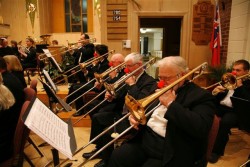
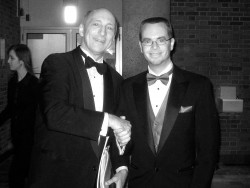
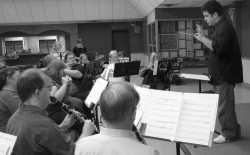
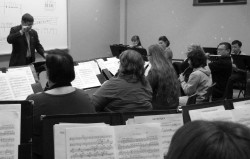
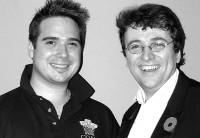
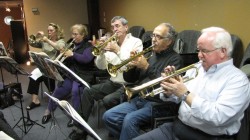
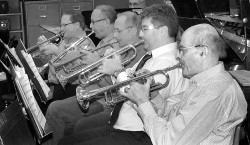
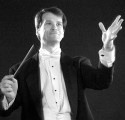
 I switched from bass trombone in the Beethoven to an antique Soviet Army rotary valve baritone horn in the Colonel Bogey march at the IWBC. I also went from a tuxedo on Saturday to a T-shirt on Sunday, and from The Glenn Gould Studio Saturday to a grassy slope at the Humber College Lakeshore Campus for the IWBC. It certainly was a weekend of variety!
I switched from bass trombone in the Beethoven to an antique Soviet Army rotary valve baritone horn in the Colonel Bogey march at the IWBC. I also went from a tuxedo on Saturday to a T-shirt on Sunday, and from The Glenn Gould Studio Saturday to a grassy slope at the Humber College Lakeshore Campus for the IWBC. It certainly was a weekend of variety!